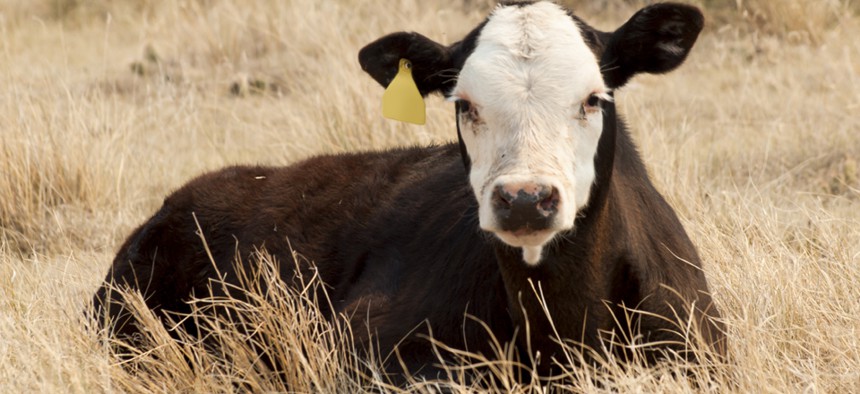
Arina P Habich/Shutterstock.com
The Fight Over the Bundy Cows Will End as Civics 101, Not Fort Sumter II
Government is bringing its legal powers to bear on rancher who initiated an armed stand-off with BLM.
The showdown between Nevada rancher Cliven Bundy and the Bureau of Land Management has now moved into a new phase, marked not by the armed showdown long-desired by anti-government activists, but by the government slowly bringing the grinding weight of its legal powers to bear on the admitted lawbreaker. Few people would have guessed that the most potent political fight of 2014 would involve a stand-off over livestock, but here we are.
One of the interesting aspects of the story is that it has largely flown under the radar. The Wire noted the end to the original standoff, but a quick review is in order. Last year, the government banned Bundy from grazing his cattle in a certain area, largely because Bundy refused to adhere to a 1993 stipulation meant to protect the desert tortoise. Bundy continued to let his cattle graze, and the Bureau of Land Management seized the animals. Activists rushed to Bundy's defense after authorities tased his son and he called for a "range war." Hundreds, including some who were armed, travelled to Nevada. On Saturday, they marched to where the cattle were being held and the authorities, not wanting an armed conflict, released the animals. What comes next isn't clear, but the government assured Bundy on Tuesday that the fight is not over.
Bundy wanted a fight. He encouraged an interpretation of his situation as pitting a solitary cowboy, a traditionalist, against the weight of the federal government. As Politico notes , Bundy himself rejects the authority of the federal government, adhering instead to the "sovereign state of Nevada."
The word that hung over the conflict this weekend was "Waco." The government "may come back with a lot more force like they did at Waco with the Davidians," former Rep. Ron Paul told Fox News over the weekend. There's no question that some militia members showed up ready to fight; according to one report , a militia leader was strategizing about the use of human shields. The government's decision to return the animals was seen as a victory for the anti-government crowd — and more mainstream conservative outlets.
Now the fight has moved to a new stage. The government, including Senate Majority Leader Harry Reid , insists that the dispute is not over. Bundy: "I don’t have a response for Harry Reid, but I have a response for every county sheriff across the United States. Disarm the federal bureaucrats." The romantic idea of cowboys on horseback defending their land from shadowy government agents holds enormous appeal for the in-vogue "Don't tread on me"/"The tree of liberty must be watered with the blood of tyrants" arm of the far right. Sean Hannity warned on Tuesday night that "something is brewing," following Reid's remarks. "[W]hat would happen if they came in the early morning hours one day to your ranch?," he asked Bundy. Bundy replied: "If that's what we've got to do, we'll just deal with you. If you've got guts enough to do it, then come on."
It's extremely unlikely that this dispute will end the way Waco did. The government has nothing but time on its hands — unlike at the Branch Davidian compound, where authorities worried about the safety of people inside. It began the slow process of leaning on Bundy in 1993; another 20 years means little to the feds. "The BLM will continue to work to resolve the matter administratively and judicially," BLM Director Neil Kornze said in a statement reported by The Hill . D.C. attorney Jonathan Emord who outlined the likely strategy: "They'll press charges against him in federal court, and they’ll try to basically bleed his ability to defend himself, and beat him up on technical grounds... They'll put him in a situation where he'll end up with a determination of liability that would be so great that he would have to sell his ranch to them to extinguish his debt."
That's a less romantic ending, if the more likely — and more legal — one. "[T]his is a nation with a 'government of laws and not of men' — and not the other way around," conservative columnist Charles C. W. Cooke writes at the National Review , "and it seems to me that this principle should not be considered null and void because one of those men happens to have an agreeable tale, a photogenic complaint, and a romantic genealogical past." Slate's Jamelle Bouie put that argument in another frame: "What if Bundy ranch were owned by a bunch of black people?" The answer, Bouie points out, is that the reaction among patriots would likely be more muted.
There are specifics to the Bundy case that make this feel like a just cause célèbre . Romanticism and a flair for patriotic drama, however, tend not to have the same sort of staying power as government bureaucracy. The Bundy situation is interesting and a good point of debate, but the peak of its revolutionary fervor has probably already passed.
( Top image via Arina P Habich / Shutterstock.com )
NEXT STORY: Play of the Day: Your Tax Dollars at Work







